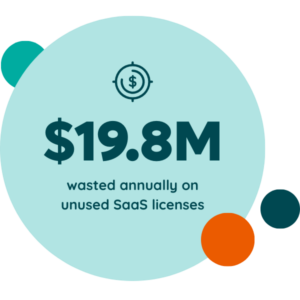
5 Industry Experts Weigh In on the 2026 SaaS Management Index
Table of Contents ToggleWhat Is a SaaS Renewal?Why SaaS Renewals MatterTypes...
Back
Back
Search for Keywords...
Blog

Table of Contents
Updated February 5, 2026 with new data.
The average enterprise faces nearly 211 SaaS renewals every year—almost one for every business day. Each of those renewals carries real financial weight. Here’s the truth: renewal is the only time you can truly save money on your SaaS portfolio. Miss that window, and you’re stuck paying more for unused licenses, rising vendor prices, or contracts that no longer fit.
In this guide, we’ll show you how to approach renewals strategically, so your organization avoids wasted spend, reduces risk, and maximizes value from every contract.
A SaaS renewal—also known as a software renewal—is the point when an existing subscription term ends and a new agreement begins. For many organizations, renewals happen automatically unless action is taken. That makes them a pivotal opportunity to reset contract terms, reduce license waste, and align spend with actual usage.
In this section, we’ll cover:
A renewal typically occurs at the end of a contract term, usually one year.
At this stage, the contract either extends automatically or requires the buyer to make an intentional decision. Vendors often include auto-renewal clauses that lock organizations into new terms unless notice is given within a specific window.
Auto-renewals can quietly drain budgets if teams are unprepared. With the average enterprise facing hundreds of renewals each year, it’s easy for deadlines to slip through the cracks. Missing the cancellation or renegotiation window means paying for licenses that may be unused or unnecessary, while also accepting vendor-driven price increases.
Despite the risks, renewals also create a rare moment of leverage. This is the one point in the contract lifecycle where buyers can:
A renewal handled with foresight can generate immediate savings and prevent waste, which is why organizations that treat renewals as a strategic process consistently report stronger cost control.
With so many renewals to manage each year, every missed opportunity compounds into wasted spend and greater risk. Key areas that explain why renewals matter most include:
SaaS buying has shifted beyond IT. Today, lines of business own 81% of SaaS spend and more than half of applications, while IT controls only a fraction. Employees also bring in their own tools through expense reports, contributing to shadow IT. This decentralization makes it harder to track ownership, monitor usage, and stay ahead of renewal deadlines.
SaaS is often the second largest operating expense for enterprises—and costs only continue to rise.
Without a deliberate renewal strategy, organizations face mounting costs as vendors raise prices and contract models grow more complex.
Portfolios continue to expand even as budgets tighten. According to the 2026 SaaS Management Index, the average organization manages 305 applications, with portfolios growing more than 30% annually. This expansion increases renewal volume and raises the risk of:
Renewals present an opportunity to rationalize applications and eliminate this waste before it escalates further.
Understanding the primary subscription models enables organizations to anticipate costs and prepare for renewals effectively. The most common models include:
Monthly subscriptions:
Annual contracts:
Usage-based subscriptions:
Tiered pricing:
Auto-renewal clauses are built into most software contracts. They extend the subscription automatically unless the customer opts out within a specified window. With hundreds of renewals happening each year in large enterprises, these clauses can quietly drive overspending if not closely managed.
The main risk of auto-renewals is financial lock-in.
The primary goals of a renewal strategy include:
A renewal strategy defines how an organization approaches each contract event to maximize value and minimize waste. Without clear goals, teams often default to reacting at the last minute. A structured process ensures renewals drive cost savings, security, and alignment with business needs.
Organizations that set these objectives create a foundation for proactive SaaS Management. They turn renewals from a recurring administrative task into a disciplined practice that delivers measurable outcomes.
Marigold Uses Zylo to Save on Sprawling SaaS Costs & Streamline M&A Technology Integration
Discover how Marigold unlocked the door to nearly $1M in SaaS cost savings with Zylo, while undergoing a M&A tech integration and cutting software waste from their portfolio.
Effective preparation follows four essential steps:
Preparation determines whether a renewal is an opportunity or a liability. Even one missed deadline can lock the organization into unnecessary spend. Having ample time to prepare is critical, especially for large, enterprise suites such as Microsoft or Salesforce.
“Staying on top of a schedule and knowing what renews when is not an easy thing to do. So the intelligence to me is know what’s coming, know what you’re using, and know what you’re paying is a reasonable price.”
— Keith Sarbaugh, CIO at Zoetis
Understanding your portfolio starts with discovery. You need to know:
Centralizing this information into a SaaS system of record creates a single source of truth for your team. It helps stakeholders know what software is in use and who is responsible for each application. Often, this process reveals duplicate tools or apps acquired outside of IT oversight.

Ask yourself these questions:
Analyze license usage to find over-purchasing or under-utilization. Depending on the data and future growth plans, you will need to reduce or increase your license count.
Identify applications with similar functionality and multiple spend sources (e.g., 3 separate contracts, 5 expensed instances). Rationalization helps eliminate redundant spend, reduce software costs, and consolidate your portfolio.
Tracking renewals in a centralized calendar allows teams to plan ahead 90 days or more. It helps:
A playbook defines the standard process before, during, and after renewal. It should include checkpoints for:
Set milestones to track renewals with alerts at 120, 90, 60, and 30 days. Standardizing these steps:
The Ultimate Guide for Wildly Effective SaaS Renewals
Learn MoreNegotiations at renewal time create the best chance to control spend and improve contract terms. Vendors expect these conversations, and organizations that prepare well often achieve better outcomes.
Effective negotiation focuses on four areas:
The last thing you want to do is cave on price in negotiation. A consistent approach helps buyers avoid surprises and maximize leverage.
Before sitting down with a vendor, gather:
Accurate data provides leverage to question license counts, feature usage, and price increases. Without it, negotiations default to vendor assumptions rather than your organization’s reality.
Successful negotiations involve multiple stakeholders. Finance, IT, legal, security, and business unit leaders should align on:
Presenting a unified position prevents vendors from exploiting gaps between departments.
While price matters, the goal is to secure terms that support the organization’s broader needs. Consider:
Negotiating beyond price ensures renewals deliver sustainable value.
Vendors want to close deals, and prepared organizations can use that leverage to their advantage. The most effective strategies focus on timing, pricing models, transparency, and outside benchmarks.
Key approaches include:
Vendors often face pressure to hit quarterly or annual revenue goals. Align renewal discussions with these cycles increases the chance of securing discounts or more favorable terms. Planning ahead ensures your team is ready to act when the vendor is motivated to move quickly.
Tiered pricing models can lead to overspending if not managed carefully. Analyzing actual usage before renewal to:
Communicating clear budget parameters helps:
Vendors are more likely to adjust pricing or terms when presented with credible outside data. Strengthen your negotiation position by using:
Using third-party validation adds weight to internal usage analysis and creates leverage in conversations.
Zylo equips procurement teams with the visibility, data, and support to make renewals strategic. It helps organizations:
With Zylo, Procurement gains:
“We utilize Zylo to evaluate the actual use of these tools. How many users licenses do we have? How many are being utilized? How much spend do we have? When are renewals coming up? And we will sit typically on a monthly basis and evaluate what’s coming up in the next 30, 60, 90 days.”
— Karen Hodson, Global Procurement & Real Estate Officer at Marigold
With Zylo’s AI-powered discovery, uncover all the SaaS applications in use within your organization and centralize contract, spend, and usage data. That makes it easy to track:
This visibility ensures that no renewal goes unnoticed and provides your team with the insights needed to prepare for negotiations.
Whether buying a new application or negotiating a renewal, Zylo’s SaaS Negotiator Service facilitates the process from end-to-end. Using this service helps:
SaaS Operations is responsible for building and running the day-to-day processes that turn SaaS Management from ad hoc tasks into a disciplined, repeatable, proactive practice. With Zylo’s SaaS Operations Services, our experts handle this work for you, while you get the business outcomes.
Zylo’s renewal and spend management solutions empower organizations to proactively manage renewals, make data-driven decisions, eliminate waste, and save money.
This article is brought to you by Zylo – the enterprise leader in SaaS Management. Companies such as AbbVie, Adobe, Atlassian, Intuit, Salesforce, and Yahoo leverage Zylo’s AI-powered platform and unparalleled professional services to fuel centralized SaaS inventory, license optimization, and renewal management.
Ready to improve your SaaS renewal process? Contact Zylo for a demo and take control of your renewal and spend management.
A SaaS renewal is when a subscription contract ends and begins again for a new term. Renewals are the primary opportunity for buyers to adjust license counts, negotiate pricing, or cancel services.
Auto-renewal is a contract clause that extends a subscription automatically at the end of its term. Unless the customer cancels in advance, the contract renews under the same or updated terms set by the vendor.
Most auto-renewals require cancellation within a set notice period, often 30 to 90 days before the contract end date. If no action is taken, the subscription renews for the same length of time and at the vendor’s current rate.
Yes, automatic renewal is legal in most regions, but laws require vendors to clearly disclose the terms. Some jurisdictions also require reminders or customer consent prior to renewal.
Yes. Most contracts allow cancellation if notice is given before the auto-renewal window closes. Missing that window usually locks the organization into another full term.
Track renewal dates in a centralized calendar and set alerts at least 90 days ahead. This gives time to evaluate usage, align stakeholders, and notify vendors if cancellation or renegotiation is needed.
The main disadvantage is cost lock-in. Without monitoring, auto-renewals can extend unused licenses, embed price increases, and limit flexibility. Over time, this can create millions in wasted spend.
Yes. An auto-renewal is legally considered a new contract period, even if terms carry over. This is why renewals represent the only true opportunity to adjust agreements and capture savings.

Table of Contents ToggleWhat Is a SaaS Renewal?Why SaaS Renewals MatterTypes...

Table of Contents ToggleWhat Is SaaS Compliance?Why SaaS Compliance MattersKey Types...

Table of Contents ToggleWhat Is a SaaS Renewal?Why SaaS Renewals MatterTypes...

Table of Contents ToggleWhat Is a SaaS Renewal?Why SaaS Renewals MatterTypes...
| Cookie | Duration | Description |
|---|---|---|
| cookielawinfo-checkbox-analytics | 11 months | This cookie is set by GDPR Cookie Consent plugin. The cookie is used to store the user consent for the cookies in the category "Analytics". |
| cookielawinfo-checkbox-functional | 11 months | The cookie is set by GDPR cookie consent to record the user consent for the cookies in the category "Functional". |
| cookielawinfo-checkbox-necessary | 11 months | This cookie is set by GDPR Cookie Consent plugin. The cookies is used to store the user consent for the cookies in the category "Necessary". |
| cookielawinfo-checkbox-others | 11 months | This cookie is set by GDPR Cookie Consent plugin. The cookie is used to store the user consent for the cookies in the category "Other. |
| cookielawinfo-checkbox-performance | 11 months | This cookie is set by GDPR Cookie Consent plugin. The cookie is used to store the user consent for the cookies in the category "Performance". |
| viewed_cookie_policy | 11 months | The cookie is set by the GDPR Cookie Consent plugin and is used to store whether or not user has consented to the use of cookies. It does not store any personal data. |